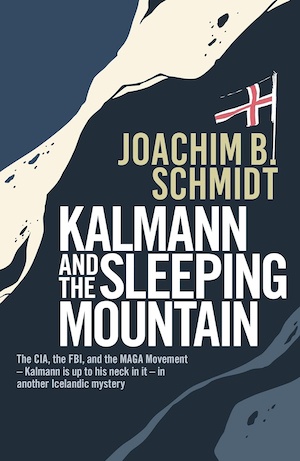
Translated by Jamie Lee Searle — If you haven’t read the first Kalmann novel, first published in 2022, you’ll probably find the opening section its sequel quite disorientating. Ever if you have read it, you may still feel that way. The story is told from the perspective of Kalmann, a young man with learning difficulties who finds himself in FBI custody in Washington, DC. Elements of the storyline in the first novel pop up in his stream of consciousness – the disappearance of a hotel owner, a deadly encounter with a polar bear – as do some of the characters. You might benefit from knowing them already.
But gradually we get a picture of why Kalmann is in the US and the madcap background is filled in. He’s been visiting his biological father, a former US army man who was stationed in the Iceland decades back, plus his half sisters and extended American family. They all happen to be massive Trump supporters and his father and Uncle Bucky actually took Kalmann to the 6 January Capitol insurrection where he was arrested.
Thankfully, the FBI agent is sympathetic, but during the interrogation it turns out that the Bureau has a file on Kalmann’s recently deceased maternal grandfather, Odin.
Apparently, he was the political opposite to Kalmann’s father, and was a communist spy who snooped around a US radar base on a mountain in northeast Iceland during the Cold War, for the Soviets. Now we factor in Kalmann’s deep emotional connection to his grandfather. Recently, he has been facing up to Odin’s death and it’s hard because as distant as Odin was, he raised Kalmann and taught him how to hunt Arctic fox and Greenland shark. Even with his mother’s help, coping with all those emotions led to a violent breakdown and an eventual blackout for Kalmann. Going to the States is part of his recovery.
When back in Iceland, Kalmann is egged on by his online friend Noi (as in annoying, perhaps) and gets to thinking that Odin may have been murdered. He’s had plenty of clues so far, all he needs to do is put them together and start investigating. And this he does. After all, he’s the unofficial Sheriff of Raufarhöfn, with a hat and a badge to prove it. At first, people think all of this is part of Kalmann’s way of coping with the world around him, but in fact the coping mechanisms he uses to overcome his neurodivergence serve him well in the investigation.
As with Henri Koskinen in Antti Tuomainen’s novels, Kalmann’s unique approach to life is one of the delights of reading this novel. He’s been told he has the academic capacity of a six-year-old, and is called various names, but the novel shows that although Kalmann seems to lack common sense, he has more sense than many of those around him. At times, he’s an extremely frustrating character. At others you’ll have no idea why he’s taking a particular action – such as setting out to sea at nightfall. It gives another meaning to the word ‘suspense’.
Eventually, he comes face-to-face with a killer, and some of the things author Joachim B Schmidt has set up earlier in the novel (which might have puzzled you at the time) become factors in the outcome, to very pleasing effect. Even as Kalmann steps up as an action hero, with the lives of others in his hands, the author doesn’t gloss over the character’s vulnerability. Away from the action, and earlier in the novel, there are glimpses of how testing life has been for his mother, and the incredible love she has for him. This will probably resonate with any parent, but particularly anyone who cares for someone with special needs.
It’s been said that the Kalmann books are unlike anything you’ve ever read in Nordic noir, but I don’t think that’s the case. The wintry backdrop, the sense of isolation and the dangers posed by the landscape and climate are present. Nordic noir investigations tend to have a certain dedication to logic and you’ll find that here too – with an interesting twist. And, in common with the Erlendur novels by Arnaldur Indridason, for example, there is a quirky directness to the characters, layered with a touch of melancholy, which creates an emotional depth that belies the simplicity of the storytelling. You might even shed a tear or two along the way.
Interestingly, Kalmann author Joachim B Schmidt is a Swiss emigre to Iceland. Read our interview here.
Bitter Lemon Press
Print/Kindle
£7.99
CFL Rating: 4 Stars









